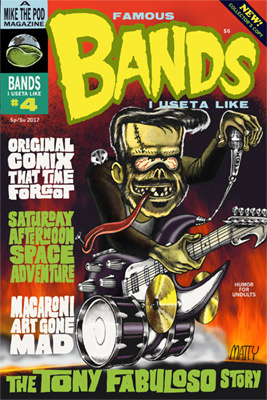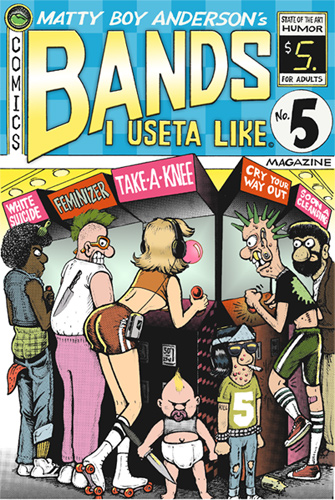So one of my favorite directors made an adaptation of a novel by my favorite writer. That’s a big deal.
In fact, it’s a huge deal. There was a time when I and friends who also read Thomas Pynchon thought that Mason & Dixon, his masterpiece from 1997, was his final effort. Then we figured the swan song was his sublime Against The Day, from 2006. Inherent Vice came along in 2009, and we finally realized that we were witness to a thriving, percolating phase in the lifetime of a literary master.

Director Paul Thomas Anderson read Inherent Vice in 2009 and rightly deduced that it would be the most filmable of Pynchon’s oeuvre. Oh, how I long for a Terry Gilliam adaptation of Mason & Dixon, with a big budget and perfect casting, but this does just fine for the time being. Besides, now it’s on record that audience interest in Pynchon adaptations exists. Maybe someday we’ll get Against The Day, or, since I’m really blue-skying here, Gravity’s Rainbow*. It’s now in the realm of possibility.
*1974 U.S. National Book Award for Fiction.
Thankfully, as with Gilliam’s Fear and Loathing in Las Vegas, this is a faithful translation, with great reverence towards Pynchon’s prose. With Anderson directing, Inherent Vice gets the authentic 70s California flavor it requires. He gets the cast to take the risks necessary to evoke the casual recklessness of the era. Pynchon’s story supplies the neo-noir backbone and eyewitnessed debauchery, and Anderson places the visual eyebrows on it.
I waited until I’d read the book to see the film, which was written for the screen by Anderson. He does a very surgical job of paring down the dialogue, with a good ear for timing, and makes the third-person text into a narration for Joanna Newsom, who plays Sortilège. Newsom is a harpist, and an extremely natural presence in the film’s setting. At first I found Newsom’s narration a touch out of place; on repeated viewings, I realized that she’d given the presentation a unique and believable face and voice.

Newsom as Sortilège. She often evokes Janis Joplin, and look how the sunlight hits her hair. 70s all the way.
In 1970 Los Angeles, Doc Sportello is a pothead PI with a pad on Gordita Beach. In casting worthy of loud exaltation, he is played by Joaquin Phoenix.
I never thought much of Phoenix one way or another; I’m not a huge Gladiator fan, and he actually pissed me off once, when I gave him the benefit of the doubt and sat through the entirety of I’m Still Here, that piece of shit rapper hoax he tried to pull with Casey Affleck. I forgave all that (and The Village) with Inherent Vice. Phoenix is a perfect fit as Sportello. He’s a joy to watch, and funnier than I knew he could be. He is to this film what Jeff Bridges was to The Big Lebowski; a marijuana-scented fuzzball you can’t help but like. Admire, even.
As with Anderson’s previous films, the soundtrack and score are meticulously selected and composed. Like There Will Be Blood and The Master, Inherent Vice is scored by Radiohead’s guitarist, Jonny Greenwood. There is not a film composer I would place above him for this job. I found his passages as appropriate and desirable as the songs by Neil Young and Can that are featured.
The title rolls over Can’s immortal “Vitamin C”, from Ege Bamyasi, segueing into “Soup”, the following track. It’s as though Anderson didn’t want to take the needle off the record until absolutely necessary. Can is revered in the world of krautrock, and I adore them, so I’m not gonna get into them too deep here. Do you love Kraftwerk? Hunt down Can’s albums Tago Mago and Ege Bamyasi, to start with. Get NEU! too. It’s pronounced “noy”. Thank me later.
Greenwood included a reconstruction of an unreleased Radiohead song, “Spooks”, performed by members of Supergrass. Really, the audio of the entire film is superb. “Here Come The Ho-Dads” by The Marketts provides just the right surf backdrop, and Chuck Jackson sings “Any Day Now” over the end credits. There’s a passage where Phoenix drives to a massage parlor in the middle of nowhere, where I can’t identify the source of the music, but it’s as good as Can. I’m betting it’s Greenwood.
(UPDATE: I was correct. The track is called “Under The Paving-Stones, The Beach!”, from Greenwood’s excellent score. The title is the epigram from the novel.)
I confess glibness in remarking upon Phoenix’s cleft palate in the past, but here’s the thing. I grew up with cleft-lipped kids; it was one of those things that happened before people figured out why. That’s why it doesn’t really happen as often as it did. But if you look at Phoenix’s lip as part of the costume/character, it becomes very evocative of the time. I’m treading lightly here, because this is a sensitive subject, but my point is that Phoenix is up there on screen like a real guy in 1970 and it works. I’m a tremendous enthusiast of “textured” faces in film, and Joaquin Phoenix’s phiz is a visual smorgasbord.
Doc Sportello is approached by his ex-girlfriend Shasta Fay Hepworth, who has entered into a preternatural relationship with an eccentric married millionaire, Mickey Wolfmann (Eric Roberts, always a pleasure). Wolfmann has now disappeared, leading Sportello into a knotted web of intrigue and weirdo Californians while trying to locate him. Shasta is played by Katherine Waterston, and if you’re wondering if she’s Sam Waterston’s daughter, you’re correct. She kinda has Sam’s eyes, so if you’re a Law & Order fan, it might be weird for you when she’s fully nude on-screen for several minutes preceding one of the hottest fuck scenes I can recall in recent cinema. Not only that, she keeps a joint lit the entire time. That is Oscar material in my humble opinion.
There are tons of great roles and cameos in Inherent Vice for female actors; “actresses”, we used to call them; Jeannie Berlin (Heartbreak Kid) briefly appears as Aunt Reet, and Japonica Fenway is played by Sasha Pieterse, who could easily be Tara Reid’s replacement*. BIUL favorite Maya Rudolph is Doc’s receptionist Petunia. Michelle Sinclair makes a real impression as Clancy Charlock, drawing on her past as adult film star Belladonna. Jena Malone is barely recognizable as Hope Harlingen, reformed junkie and loving wife of the missing surf-rocker Coy (Owen Wilson).
*I would’ve liked Japonica’s scene to be a little more expanded upon, as in the novel.
(Note: I wouldn’t call that the best scene, but it’s up there.)
I’ve very much enjoyed Josh Brolin’s work, and he is excruciatingly funny here, as Lt. “Bigfoot” Bjornsen, a sadistic cop with Johnny Unitas hair. Anderson rewrote the climax of the novel a bit, to make Brolin and Phoenix’s final scene more conclusive. It’s a successful decision, creating a moment with resonance and humor equal to the book.


This is the best scene, if you had to pick one.
On my third viewing, I was far enough away from the book to appreciate its ideas coming from the film. Doc walks into “Chick Planet Massage”, where a chirpy young Chinese woman (Hong Chau) launches into a spiel about the “Pussy Eater’s Special” that assures future cult status. Phoenix has the confident easiness of Dennis Hopper, without the harsh paranoid edge. His reaction when spurned by the aforementioned pussy eaters is so genuine, he repeatedly wins you over.
Thomas Pynchon is notoriously reclusive, and no recent photos of him exist. Josh Brolin claims that Pynchon made an appearance in the movie, in the background. This is purely my own conjecture, but I believe he shows up in the cafeteria of the Chryskylodon Institute, at 1:32:50, being served soup by a trembling woman. Just a theory.
Two Neil Young songs are on the soundtrack: “Harvest” and “Journey Through The Past”. These provide an elegant and earthy setting for flashbacks of Doc and Shasta together. The scene where they try to use a Ouija board to score weed is beautifully realized. It feels like it was made for Young’s music.
Martin Short and Benicio Del Toro turn up to remind me that I will watch them in anything. Del Toro is the closest thing we have to Marlon Brando, and Short is as sharp as he was on SCTV. Really, anything I have to say about either man is indistinguishable from ass-kissing.

Owen Wilson looks the part as a confused rocker turned police informant. Like Phoenix, his unusual face adds an unfakeable authenticity to the character. A scene where they secretly meet appears to take place in the Hotel California. Anderson has a deft touch with this period, as seen in Boogie Nights. He reportedly used Fabulous Furry Freak Brothers comics as inspiration, and being that I noticed an overt allusion to them in the novel, I can confirm that this is the proper headspace for the project. Cauliflower-eared MMA fighter Keith Jardine appears as a neo-Nazi biker, and he looks like something out of Altamont. The references to 1970 culture are subtle, but innumerable.

The bats behind him aren’t for baseball.
One last note about the cast; it is pretty damn impressive to see what a movie star Reese Witherspoon has become. She’s at a Kim Novak level by this point, on her way to Grace Kelly. I kinda scoffed at her in the 90s. Her legs look like I can’t believe. Say what you want, but she looks like a gleaming diamond.
There’s a great bit early on when Doc visits Sloane Wolfmann, Mickey’s wife, played by Serena Scott Thomas (Kristin’s sister). She strides into a spot where she is perfectly lit, courtesy of the great cinematographer James Wong Howe, so she explains. This is like a fantastic Coen brothers movie not actually made by the Coen brothers.

As with Pynchon’s novel, there are dozens of incredible moments and personalities woven into the rambling narrative. Anderson is an ideal adapter of the material, as it plays to his strengths and predilections. Although I wasn’t a fan of his Magnolia, one could surely argue that it was a dry run of Pynchonesque ideas, and the Californian flavor was there from the start. It’s West Coast kismet again.
If you feel intimidated by Inherent Vice, try seeing the film first, then read the book. Otherwise I suggest you go the route I did, reading the novel first, before seeing the movie. Definitely do both. Pynchon and Anderson have reached the point in their careers where they work as naturally as breathing.
I kept the movie until it was overdue from the video store, and I can’t remember the last time that happened.











You must be logged in to post a comment.